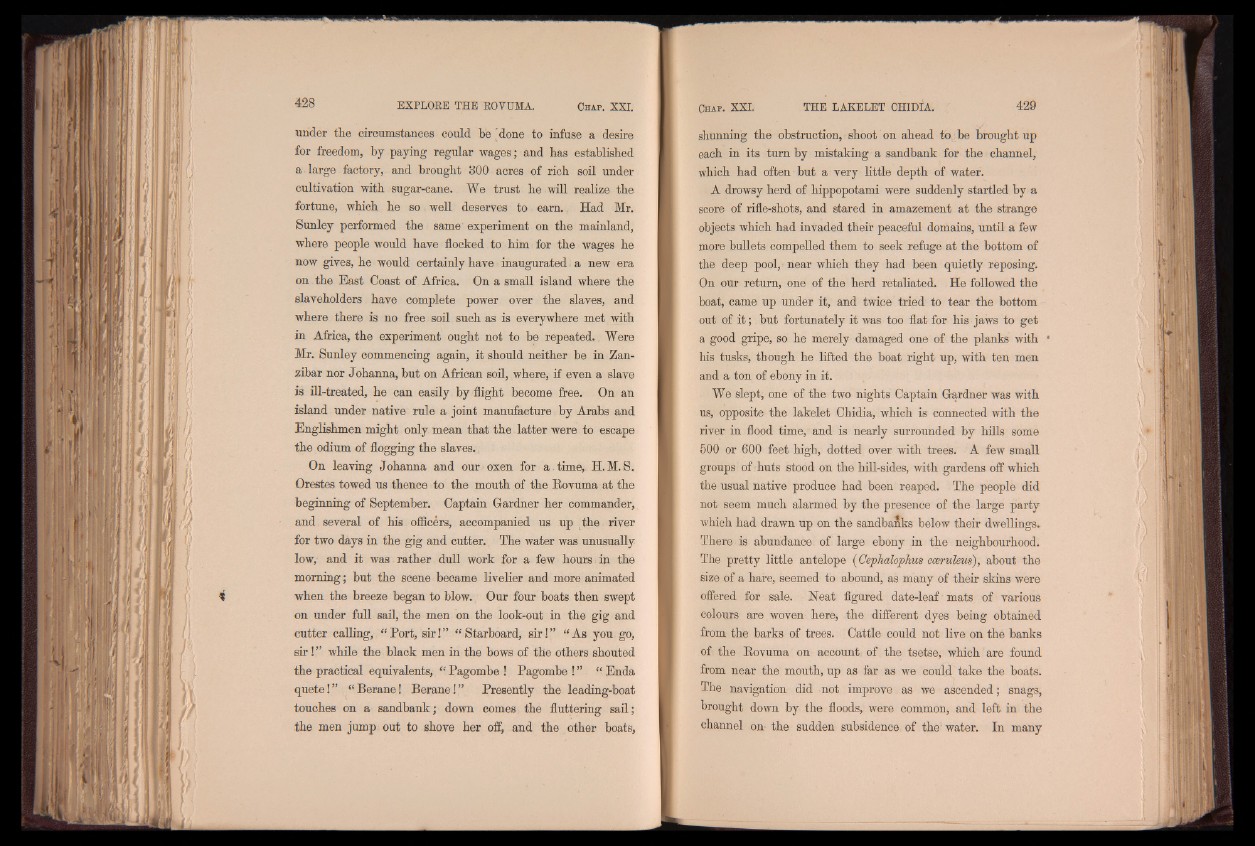
under the circumstances could be 'done to infuse a desire
for freedom, by paying regular wages; and has established
a large factory, and brought 800 acres of rich soil under
cultivation with sugar-cane. We trust he will realize the
fortune, which he so well deserves to earn. Had Mr.
Sunley performed the same experiment on the mainland,
where people would have flocked to him for the wages he
now gives, he would certainly have inaugurated a new era
on the East Coast of Africa. On a small island where the
slaveholders have complete power over the slaves, and
where there is no free soil such as is everywhere met with
in Africa, the experiment ought not to be repeated. Were
Mr. Sunley commencing again, it should neither be in Zanzibar
nor Johanna, but on African soil, where, if even a slave
is ill-treated, he can easily by flight become free. On an
island under native rule a joint manufacture by Arabs and
Englishmen might only mean that the latter were to escape
the odium of flogging the slaves.
On leaving Johanna and our oxen for a time, H.M.S.
Orestes towed us thence to the mouth of the Kovuma at the
beginning of September. Captain Gardner her commander,
and several of his officers, accompanied us up the river
for two days in the gig and cutter. The water was unusually
low, and it was rather dull work for a few hours in the
morning; but the scene became livelier and more animated
when the breeze began to blow. Our four boats then swept
on under full sail, the men on the look-out in the gig and
cutter calling, “ Port, sir!” “ Starboard, sir!” “As you go,
s ir! ” while the black men in the bows of the others shouted
the practical equivalents, “ Pagombe ! Pagombe ! ” “ Enda
quete!” “ Berane! Berane!” Presently the leading-boat
touches on a sandbank; down comes the fluttering sail;
the men jump out to shove her off, and the other boats,
shunning the obstruction, shoot on ahead to be brought up
each in its turn by mistaking a sandbank for the channel,
which had often but a very little depth of water.
A drowsy herd of hippopotami were suddenly startled by a
score of rifle-shots, and stared in amazement at the strange
objects which had invaded their peaceful domains, until a few
more bullets compelled them to seek refuge at the bottom of
the deep pool, near which they had been quietly reposing.
On our return, one of the herd retaliated. He followed the
boat, came up under it, and twice tried to tear the bottom
out of it; but fortunately it was too flat for his jaws to get
a good gripe, so he merely damaged one of the planks with •
his tusks, though he lifted the boat right up, with ten men
and a ton of ebony in it.
We slept, one of the two nights Captain Gardner was with
us, opposite the lakelet Chidia, which is connected with the
river in flood time, and is nearly surrounded by hills some
500 or 600 feet high, dotted over with trees. A few small
groups of huts stood on the hill-sides, with gardens off which
the usual native produce had been reaped. The people did
not seem much alarmed by the presence of the large party
which had drawn up on the sandbanks below their dwellings.
There is abundance of large ebony in the neighbourhood.
The pretty little antelope (Cephalophus cceruleus), about the
size of a hare, seemed to abound, as many of their skins were
offered for sale. Neat figured date-leaf mats of various
colours are woven here, the different dyes being obtained
from the barks of trees. Cattle could not live on the banks
of the Rovuma on account of the tsetse, which are found
from near the mouth, up as far as we could take the boats.
The navigation did not improve as we ascended; snags,
brought down by the floods, were common, and left in the
channel on the sudden subsidence of the' water. In many